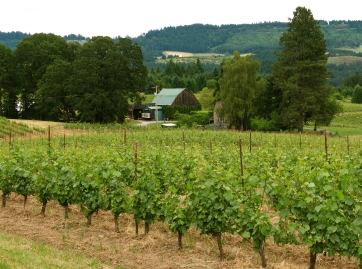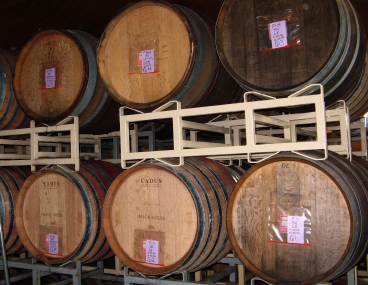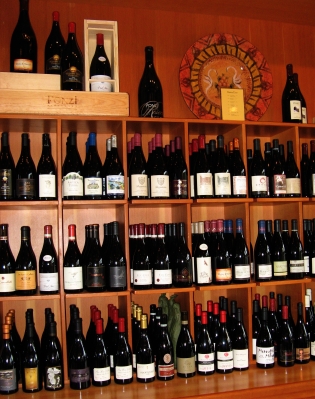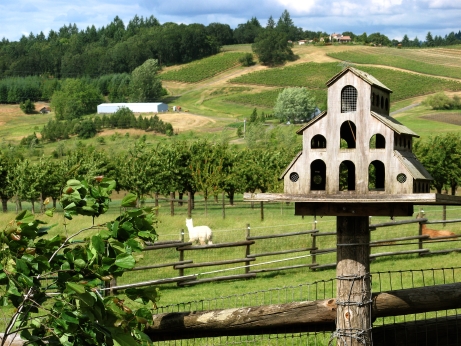And so, my quest continues through Oregon’s northern Willamette Valley for fabulous wines that are good for the environment. The area we visited, including the Chehalem Valley and Dundee Hills, is less than an hour’s drive south of Portland—provided you don’t hit bad traffic (avoid rush hour).

Biodynamic vineyards at Brick House winemakers
Vines Harmonized to Nature: Brick House Vineyards
When Ken and I drive up to the farmhouse and tasting room of Brick House Vineyards, dogs Guy Noir and True Blue bound up to greet us, followed soon thereafter by Doug Tunnell, owner and winemaker, who shows us around his pristine land before leading us to the barn/tasting room. (Tastings can only be done by making a reservation in advance.)
There, we sip Pinot Noir and Chardonnay while Tunnell explains eco-friendly grape farming. Brick House Vineyards is certified biodynamic, meaning it does not use any harsh systemic fungicides, herbicides, insecticides or pesticides—which pollute the earth and bodies of water. Biodynamic growers follow organic principals and focus on nourishing vines and soil through use of manure, crop rotation, natural pest control, and lunar planting (done according to the moon’s phases).

Brick House Vineyard’s wine-aging barrels
Surrounded by the fruit and hazelnut orchards above the Chehalem Valley (several miles from the town of Newberg), Brick House is truly a New World winery dedicated to Old World ways of growing grapes.
“Biodynamic farming is connected to old wisdoms that a lot of farmers have gotten away from,” says Tunnell. “Grapevines are attuned to natural forces, including the changes in the moon. Biodynamics optimizes this,” he explains.
And the results are in the glass: Brick House wines are absolutely exquisite on the palette. The Cuvee du Tonnelier Pinot Noir is pricey ($39 per bottle), but its rich berry flavor with very mild tannins is so divine.
Brick House wines are distributed in a few states throughout the country (including Portland, Seattle, New York, Chicago, San Francisco) and the Pinot Noir and Chardonnay are available for shipping right to your home. What better souvenir?
Culinary Center for the Willamette Valley
Up next: lunch at the Dundee Bistro in the town of Dundee, followed by a wine tasting at the adjacent Ponzi Wine Bar. The bistro is owned by the Ponzi family, one of the first families to plant Pinot Noir in the Willamette Valley, and it blends culinary sophistication with a casual, modern atmosphere.
Dundee Bistro’s chefs cook with organic products and support local farmers committed to sustainable agricultural practices—and fortunately there are quite a lot of them in Oregon.

The Ponzi Tasting Room and Wine Bar sells a variety of Oregon wines.
The restaurant’s goal is to “define” Willamette Valley cuisine, and it presents a lovely menu of locally produced wines, vegetables, nuts, fruits, mushrooms, fish and meats. We especially loved the Coq au Vin and the fresh organic salad.
After lunch, Ken and I wandered into the Ponzi Wine Bar to taste Ponzi wines, which are certified by LIVE, the Oregon program for Low-Input Viticulture and Enology. This internationally recognized program limits use of chemical pesticides and promotes planting of species appropriate to local conditions, biodiversity, and reliance on beneficial insects and plants.
The Ponzi Family supports the Oregon wine community, especially the sustainable movement, so its wine bar also sells rare wines from the region’s best producers.
During our tasting, there were many Ponzi wines we loved, but Ken and I thrilled to a dessert wine, the Ponzi Vino Gelato, made from white Riesling and Muscat grapes frozen until mid-winter. They’re then pressed and fermented to retain their sweetness. Yum!
Silo Suites: Abbey Road Farm
Ever slept in a grain silo? At Abbey Road Farm you can enjoy posh resort-style rooms, and yes, they’re housed in retrofitted silos.

Old silos have been converted into chic guest rooms at Abbey Road Farm.
When John and Judi Stuart bought this working farm near the town of Carlton, Oregon, they decided to raise chickens, goats and llamas on the 82 acres. Instead of sending the old silos to the dump, they took the eco-friendly initiative and converted them into luxury guest rooms with glorious views of the fields, gardens and orchards.
Local artisans salvaged fallen timber from the farm to create beautiful staircases, and energy-saving in-floor heating keeps visitors toasty on chilly days.
Guests can make Abbey Road their home base for exploring wine country, and if they desire, they can get an up-close experience with the farm by picking raspberries or collecting fresh eggs for breakfast.
Abbey Road Farm was booked the days Ken and I were in the area, so we have yet to experience sunrise from a silo, but the consolation prize during our stop-in visit was to sample the farm’s fresh, homemade goat cheese. It’s made daily, and guests can slather it on toast for breakfast. The Stuarts blend it with wonderful herbs: I personally found the lemon-zest variety out of this world!
—Laurel Kallenbach, writer and editor
Click here for more information on what’s happening in Oregon’s Willamette Valley wine country.
Wine Taster’s Poll: Have you ever tasted an organic wine? What did you think? And what motivated you to choose organic over conventional?

Abbey Road Farm’s birdhouses attract red-wing blackbirds and orioles.
